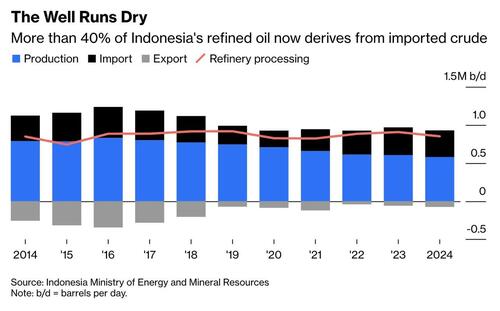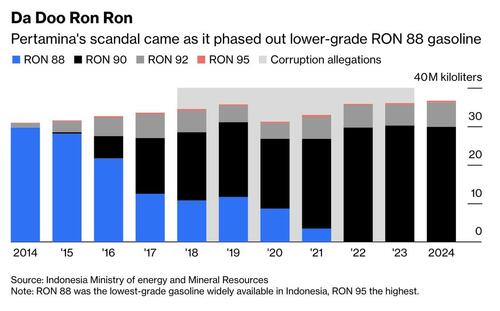Shell’s Fuel Shortage In Indonesia Proves The Next Era Is Electric
Around 200 Shell outlets in Indonesia have run out of gasoline after domestic supply disruptions tied to state oil giant PT Pertamina and a sweeping corruption probe, according to Bloomberg.
Rivals such as BP AKR and Vitol’s Vivo have also been empty for weeks. Lines now snake through Pertamina’s own stations, the only ones still reliably selling fuel — though “neither drivers, nor private competitors, trust the quality of the product it offers.” Shell decided in May to leave the retail market altogether.
A century ago, Indonesia was among the world’s great petroleum producers. A deal between a London trader and a Dutch oilfield operator in Sumatra led to the founding of what became Shell in 1907. But the nationalization of its Indonesian arm in 1957 created Pertamina, which soon became a symbol of both wealth and graft. Under General Ibnu Sutowo, who ran the company until 1976, Pertamina collapsed under billions in debt and became shorthand for elite excess.
Bloomberg writes that since those glory days, output has fallen by two-thirds while the population has doubled to 283 million. Indonesia now imports much of its refined fuel, consumes more gasoline than Germany, and boasts one of the world’s largest vehicle fleets — mostly scooters. As ever, the profits have flowed toward insiders. Suharto-era cronies dominated oil trading in the 1980s, and protests over fuel prices helped bring down his regime in 1998.
Promises of reform have repeatedly failed. President Joko Widodo once vowed to dismantle the “oil-and-gas mafia,” but corruption endured. This February, President Prabowo Subianto’s government launched an investigation into allegations that $11.9 billion was siphoned from Pertamina between 2018 and 2023 — largely by diluting premium gasoline with lower-grade fuel, damaging countless engines in the process.
Distrust has driven consumers to private retailers such as Shell, BP, and Vivo. Yet import restrictions prevented these firms from meeting surging demand. They were forced to seek extra supplies from Pertamina — and, wary of contamination, often refused delivery. The result: a nationwide fuel drought.
The chaos is accelerating Indonesia’s quiet electric revolution. Battery-powered vehicles already command more than 14% of the market, thanks to cheap electricity and falling prices. The top-selling electric scooter, the Polytron Fox R, costs roughly two-thirds as much as its gas rival, Honda’s BeAT. Even with limited public charging, private swap stations and home outlets are filling the gap.
This could be a story of renewal: a vast, resource-rich nation pivoting toward clean, affordable energy. But that future depends on loosening the grip of a fossil-fueled elite that’s profited from dysfunction for decades. As long as Pertamina’s monopoly endures, innovation will struggle to breathe.
Indonesia’s gasoline crisis mirrors the public anger spilling into its streets — both driven by a collapse of trust in the state. If President Prabowo wants to get ahead of that, he should use the EV boom to open the market and curb Pertamina’s dominance, “acting as ruthlessly as his predecessor Widodo did in liquidating its scandal-plagued trading arm back in 2015.”
The kleptocratic habits of the Suharto years have no place in a modern democracy. The well has run dry; the future, unmistakably, is electric.
Tyler Durden
Mon, 10/20/2025 – 04:15ZeroHedge NewsRead More






 R1
R1
 T1
T1


